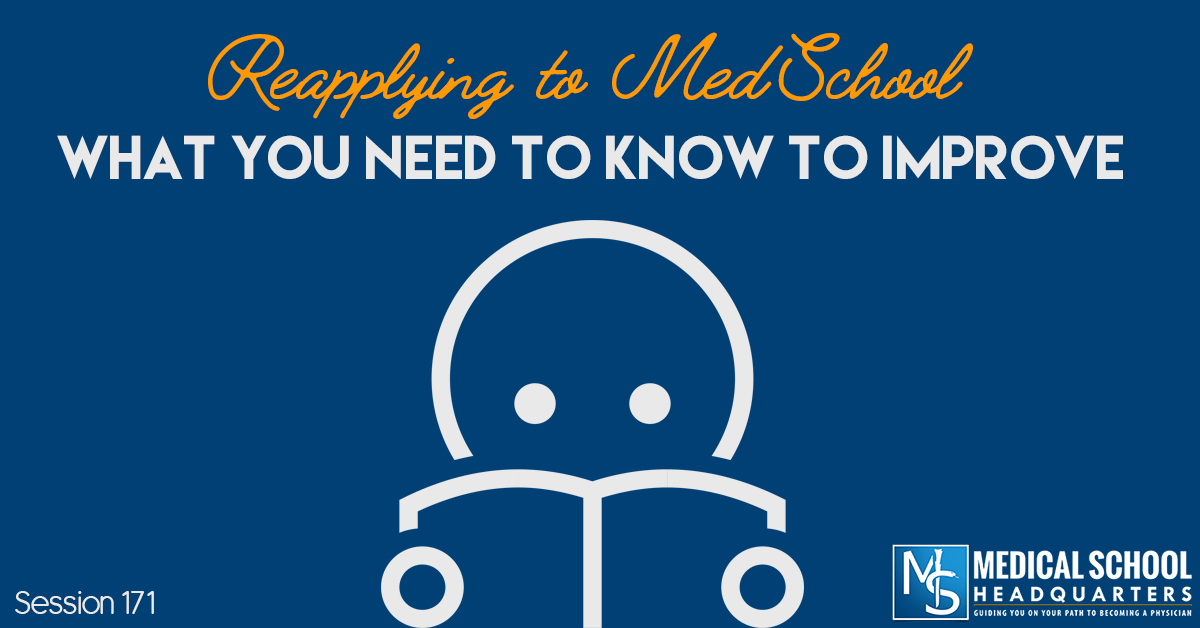Apple Podcasts | Google Podcasts
Session 171

In this episode, I talk with Christine Crispen, the former Dean of Admissions at UC Irvine School of Medicine and current Director in the Office of Curriculum at the Keck School of Medicine of USC.
Christine and I talk about reapplying to medical school, as seen through the eyes of someone who has been on the Admissions Committee. We also discuss the biggest reason applicants don’t get into medical school and what you should be thinking about when you reapply.
You have to realize that applying to medical school is a numbers game. There are good applicants who sadly don’t get in the first time around because there are more applicants than there are spots. Out of thousands of applicants for each school, only the top 8-10% will get the chance to be interviewed. Because applying to medical school is very expensive, not to mention all the hard work that goes along with it, you need to put your best foot forward.
Listen to this podcast episode with the player above, or keep reading for the highlights and takeaway points.
The Number One Mistake Students Make When Applying to Medical School
The most common mistake students make when they apply to medical school is having not enough clinical exposure or clinical experience.
Start with some shadowing in your freshman year of college, and then add more clinical experiences in your later years. Here are some great ideas:
- Scribing
- Clinical care extender programs (volunteering in hospital wards)
- Hospice volunteering
[Related episode: What Is the Best Paid Clinical Experience for Med School?]
Reapplying to Medical School: What You Need to Do to Prepare
-
Assess your application.
Go from top to bottom.
- Start off with your academics.
- Are you within the average MCAT and GPA scores for the schools you’re applying to?
- You are more than your numbers, but especially if your stats are below the 10th percentile scores, it could be a weakness in your application that you should target.
Next, look at your clinical exposure.
- Make sure to have some longevity in clinical exposure, doing it for a few years if possible. Have leadership experience within that clinical exposure, if possible. Grow within your roles.
- For applying to research-intensive schools, do you have research exposure? Do you have research experience or publications?
What else do you have in your application?
- Extracurriculars
- Work
- Other activities that demonstrated who you are and the altruism you’re dedicating your life to
What did you write in your personal statement?
- What did you say?
- How did you say it?
- Were there typos or anything missing?
- Did you directly and passionately answer the question of why you want to be a doctor?
How did you write your secondary essays? Did you answer the questions thoroughly? Did you use a resource like our Secondary Essay Library to prewrite your secondaries, so you could turn them around quickly? It’s important to turn your secondaries around quickly.
-
Seek advice from the premed office of the medical school you’re interested in.
Ask somebody else to read your application. If you know a physician or someone on the admissions committee who has done this before, ask if they could review your application and see what areas can be improved upon. Consider working with me, and I can help you identify which areas to improve myself.
-
If you know your academics are strong, focus on the clinical area.
If you’re ever in doubt about what’s wrong with your application, and if you know your academics are strong, then it’s likely you need more clinical experience.
Take a Year Off to Fix Your Application Before Reapplying
Applying to medical school is very expensive. If you just jump back in with the same application, why would you expect a different result? So take a year off in between your application cycles. Really completely address the problems on your application, and then reapply.
If you just reapply with the same application, why would you expect a different result?Click To TweetHow Do Medical Schools Look at Reapplicants?
- They look at your academics and wonder what the issues were for not getting in the first time.
- They look at your clinical experiences to see whether you’ve made improvements within the last year or two.
- With a fresh set of eyes, they reassess how you’re performing and whether you’re a fit for that school.
- They want to see your growth from the prior application to the current application.
- Each school will view your application a little differently.
Should You Retake the MCAT When Reapplying to Medical School?
Look at your current score. If you’re safely within the school’s range of MCAT scores they’ve accepted in previous years, do not take the MCAT again. It’s a high risk if your score drops, and if you’re in the range of what the school regularly accepts, it likely was not your issue.
If you're safely within the school's range of MCAT scores they've accepted in previous years, do not take the MCAT again. Click To TweetIf you’re far below the MCAT averages of the school you’re applying to, consider retaking the MCAT. But take time to study first. Don’t just assume your score will increase. Identify what your weaknesses were in the exam, and fix them. Only take the exam when you’re ready.
Personally, I recommend Blueprint MCAT (formerly Next Step Test Prep)’s 1-on-1 tutoring if you need to fix a particular section of your MCAT score. If you take a general prep course, it won’t be tailored to your specific needs. But 1-on-1 attention from an MCAT tutor at Next Step can help you directly address the areas you need help in. If you’re interested in that, use promo code “MSHQ” for 10% off Next Step full-length practice tests or “MSHQTOC” for $50 off MCAT tutoring or the Next Step MCAT Course at Blueprint MCAT (formerly Next Step Test Prep)!
Quality vs. Quantity on Your Application
- A passive, short-lived extracurricular activity doesn’t have much weight.
- The quality of the experience is very significant.
- They weigh it based on the activity versus time.
- This is why you need to strive for consistent, ongoing clinical experience and pursue things you’re passionate about.
Do I Need New Letters of Recommendation When Reapplying to Medical School?
- Who are your letters from?
- Meet the recommendation requirements of the school.
- Keep in contact (to some degree) with your original letter writers.
- Get additional letters or new letters from the same sources.
- You want to emphasize your growth since your last application.
- Have a current letter, recent research, or something current you’ve done to show your letter writers. This way they can write about new things you’ve added to your application.
Should You Address in Your Personal Statement That You Didn’t Get in Last Time?
- Personal statements are valuable real estate.
- A brief, few sentences explaining how you’ve grown from the experience is appropriate.
- Don’t dwell on it. Don’t make it a negative. Stay positive in your personal statement.
- Use it as a learning experience, and explain how you learned.
The Biggest Mistake Reapplicants to Medical School Make
The worst mistake you can make when reapplying to medical school is just submitting the exact same application from the year before with no improvement or change.
Some pieces of advice for premed students:
Have faith. If you know you’ve done everything you can, have faith that it’s going to come through for you. And don’t allow rejection to crush you. Take a step back. Start thinking about the areas you need to improve upon, and just make the improvements necessary.
Don't be crushed by rejection. Just identify where you need to improve, and make the improvements necessary.Click To TweetLinks and Other Resources
- Check out my Premed Playbook series of books (available on Amazon), with installments on the personal statement, the medical school interview, and the MCAT.
- Related episode: Rejected at 32: What Should I Do Now?
- Related episode: Should I Turn Down a DO Acceptance and Reapply to MD Schools?
- Need MCAT Prep? Save on tutoring, classes, and full-length practice tests by using promo code “MSHQ” for 10% off Next Step full-length practice tests or “MSHQTOC” for $50 off MCAT tutoring or the Next Step MCAT Course at Blueprint MCAT (formerly Next Step Test Prep)!











